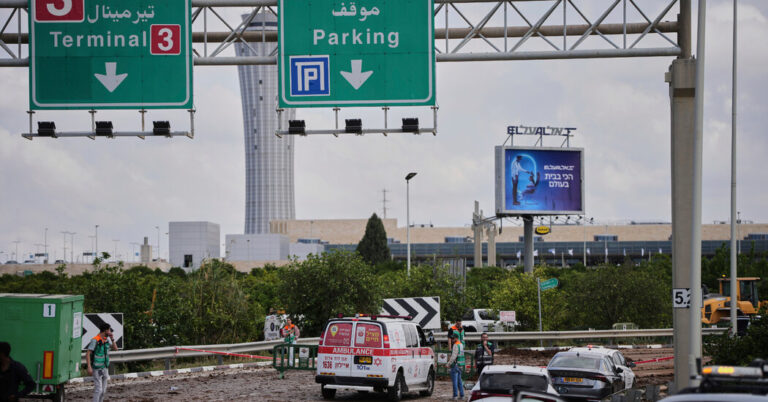A ballistic missile launched from Yemen struck near the main terminal of Israel’s international airport close to Tel Aviv on Sunday, after the military failed to intercept the projectile seemingly aimed at one of the country’s most sensitive locations.
The strike, carried out by the Iranian-backed Houthi militia, resulted in a temporary suspension of flights. There were no immediate reports of fatalities.
Israel’s military said that several efforts were made to intercept the missile and that an impact was identified in the area of Ben Gurion Airport. The military added that the episode was under review.
The Magen David Adom emergency ambulance service said it was treating four people who were mildly or moderately injured by the blast and two others who were injured while running for shelter.
Prime Minister Benjamin Netanyahu called an urgent consultation of his security cabinet on Sunday. In a video posted shortly after on social media, Mr. Netanyahu stopped short of issuing a specific threat of retaliation.
“We have acted in the past, we will act in the future,” he said of the Houthis. He also noted that the United States was targeting the Houthis in Yemen, in coordination with Israel.
Israel Katz, the country’s defense minister, had suggested soon after the attack that there would be a harsh response.
“Whoever harms us will be harmed by us sevenfold,” Mr. Katz said in a statement.
The airport resumed operations about an hour after the strike, but some international airlines canceled scheduled arrivals and departures.
The Houthi militia began firing missiles at Israel more than a year ago in solidarity with Hamas, the Iran-backed group in the Gaza Strip. It has stepped up its attacks since Israel ended a cease-fire in Gaza in mid-March.
Sunday’s missile, which struck at the start of the workweek in Israel, was the fourth by the Houthis targeting Israel over the past 48 hours. The other three were intercepted.
Israel’s Arrow aerial-defense system, which is able to hit targets high in the atmosphere or beyond the atmosphere, has been successful in thwarting many long-range missile attacks. In October, the United States sent Israel a THAAD advanced missile defense system to assist in fending off attacks by Iran and its allies.
But by slipping through all of the defenses, the strike near the airport was one the biggest successes for the Houthis in recent months — and one of the most serious failures for Israel.
The Houthi military spokesman, Yahya Saree, claimed responsibility for targeting the airport and, in a video statement, warned international airlines to stay away from Ben Gurion for their own safety.
Hamas praised the missile attack, which came hours after Israel’s military announced that it would mobilize thousands of additional reserve soldiers to bolster its campaign in Gaza.
More than 50,000 Palestinians have been killed in Israel’s military campaign against Hamas in Gaza, according to health officials in the enclave, who do not distinguish between combatants and civilians. The war began after Hamas led an attack on Israel in October 2023, killing about 1,200 people and taking roughly 250 others back to Gaza as hostages.
Israel says its military operations in Gaza are aimed at destroying Hamas and pressuring the group into freeing dozens of captives still held there. Mr. Netanyahu on Sunday refused to detail the military plans for Gaza but again vowed to achieve “total victory” over Hamas.
In recent months, Israel had refrained from striking back at the Houthis in Yemen as the United States intensified attacks targeting the group. Since the fall of 2023, the Houthis have repeatedly attacked commercial and naval ships in the Red Sea and the Gulf of Aden in support, they say, of Palestinians under bombardment in Gaza.
After Sunday’s strike near the airport, Israel’s opposition leaders took the government to task for failing to stop the missiles that have set off sirens across the country and sent millions of civilians rushing into bomb shelters, often in the middle of the night.
Benny Gantz, a former Israeli military chief and now the leader of a centrist opposition party, urged Mr. Netanyahu’s government to “wake up” and retaliate against Iran, even as the Trump administration is negotiating with Tehran over curbing its nuclear program.
“This isn’t Yemen — this is Iran,” Mr. Gantz said in a statement posted on social media. “Iran is the one firing ballistic missiles at the state of Israel, and it must bear the responsibility.”
Videos and images posted on social media on Sunday showed a large plume of dark smoke rising from an open area near Terminal 3 at the airport, the main international terminal, as sirens wailed and people ran for cover.
Large missile fragments could be seen on the ground outside the entrance to the building, and a road near the airport appeared to be covered in dirt and shrapnel. Footage on social media showed the police gathered in a muddy field nearby inspecting a large, deep crater.
In a statement shortly before the attack, the Israel Airport Authority said that 422 flights had been scheduled to arrive or depart on Sunday.
Myra Noveck, Adam Rasgon and Gabby Sobelman contributed reporting.


